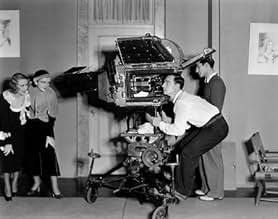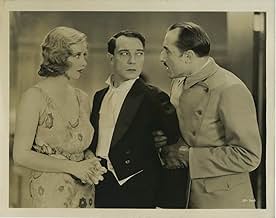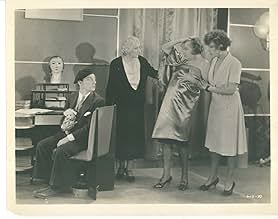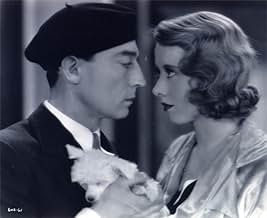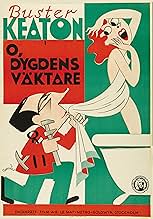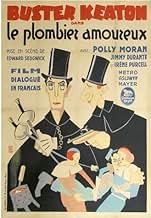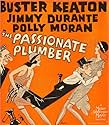Ajouter une intrigue dans votre langueTo make her lover jealous, a beautiful socialite passes off a bumbling plumber as her paramour.To make her lover jealous, a beautiful socialite passes off a bumbling plumber as her paramour.To make her lover jealous, a beautiful socialite passes off a bumbling plumber as her paramour.
- Prix
- 4 victoires au total
Edward Brophy
- Man Outside Beauty Parlor
- (uncredited)
Heinie Conklin
- Hunter with Rifle at Duel
- (uncredited)
Carl M. Leviness
- Casino Patron
- (uncredited)
Fred Malatesta
- Tony's Second
- (uncredited)
Rolfe Sedan
- Tony's Second
- (uncredited)
Stanhope Wheatcroft
- Casino Patron
- (uncredited)
Florence Wix
- Casino Patron
- (uncredited)
Avis en vedette
I thought this was a light, fun romp, 1930s style. Of course Keaton is the scene stealer in this one. I know he didn't like to do so much talking in these films, but I like his voice and delivery. I feel this film also utilizes his wide range of facial expressions more than the other MGM films. Jimmy Durante is as irritating as ever, but for some reason he hit it off with 1930s American audiences. His pairing with Keaton however, was a poor choice. I also feel Keaton did a remarkable job in this film as his life had begun to fall apart about this time. He could have made a successful go at these sort of screwball type films, but as an artist, he felt they were ridiculous and a waste of time. If MGM had let him take control of his own films, then we would have something revolutionary to watch. That being said, This one is enjoyable. Sure, it's not a classic or well thought out film, but it made me laugh, and I saw the old Keaton in there, just a little.
I have never seen nor want to see a silent Buster Keaton film so came to this without any preconceptions or anti-talkie prejudice. To me this very much has the feel of a Laurel and Hardy picture. Well made silly gentle slapstick.
When you read that this was adapted from a stage play, you're right to approach with caution but you don't need to worry about this. It's not one of those awful filmed stage plays - this was properly adapted into a proper film with a cinematic rather than a theatric script.
If you're ok with the somewhat acquired taste of American 1930s comedy acting and like Stan and Ollie, you'll probably enjoy this. Unlike many early thirties comedies, the characters are, although not realistic, actually engaging. You're interested in them, you want to know what happens to them. So often that acting style creates characters so unbelievable that you can't accept them as real people. The protagonists here however, like you find in L&H films, manage that perfect balance of absurdly with likeability.
Buster Keaton purists don't like this - it's not their Buster! Like when The Marx Brothers went to MGM and became what MGM wanted them to be, Buster Keaton became Thalberg's neutered befuddled pet. I've no problem with that. As a stand alone picture, to someone who doesn't watch silent movies, this Buster is perfect for a film like this.
His co-star is the acclaimed stage actress Irene Purcell and like Keaton, she is perfect in this too. It was, and still is rare to find an actress in the movies who is allowed be genuinely as funny as the male comedian, not just his pretty foil. She completely captures your attention and that's not just because she's so stunningly and staggeringly attractive, she has real comedy talent and this picture allows her to demonstrate this without the usual constraints of the time.
When you read that this was adapted from a stage play, you're right to approach with caution but you don't need to worry about this. It's not one of those awful filmed stage plays - this was properly adapted into a proper film with a cinematic rather than a theatric script.
If you're ok with the somewhat acquired taste of American 1930s comedy acting and like Stan and Ollie, you'll probably enjoy this. Unlike many early thirties comedies, the characters are, although not realistic, actually engaging. You're interested in them, you want to know what happens to them. So often that acting style creates characters so unbelievable that you can't accept them as real people. The protagonists here however, like you find in L&H films, manage that perfect balance of absurdly with likeability.
Buster Keaton purists don't like this - it's not their Buster! Like when The Marx Brothers went to MGM and became what MGM wanted them to be, Buster Keaton became Thalberg's neutered befuddled pet. I've no problem with that. As a stand alone picture, to someone who doesn't watch silent movies, this Buster is perfect for a film like this.
His co-star is the acclaimed stage actress Irene Purcell and like Keaton, she is perfect in this too. It was, and still is rare to find an actress in the movies who is allowed be genuinely as funny as the male comedian, not just his pretty foil. She completely captures your attention and that's not just because she's so stunningly and staggeringly attractive, she has real comedy talent and this picture allows her to demonstrate this without the usual constraints of the time.
THE PASSIONATE PLUMBER (Metro-Goldwyn-Mayer, 1932), a Buster Keaton production directed by Edward Sedgwick, stars Buster Keaton in his second "farce" comedy, the first being PARLOR, BEDROOM AND BATH (MGM, 1931). With screen adaptation by Laurence E. Johnson, and uncredited material lifted from the play "Her Cardboard Lover" by Jacques Deval, THE PASSIONATE PLUMBER, its new title, certainly improves over Keaton's previous screen sound efforts for MGM (1930-33). Though not quite a cinematic masterpiece as one could have hoped for, it's basic flaws tend to be placed on certain gag and story material as being undeveloped with resolutions left unresolved. Overlooking these minor aspects, the finished product generally blends in nicely with its basic comedy premise, even for Keaton.
Set in Paris, France, with the Arch of Triumph captured in full view for its opening, the story introduces Julius J. (J. for Julius) McCracken (Jimmy Durante) coming to Paul Le Maire's (Paul Porcasi) shop in need of a plumber for his employer to fix a leak in the shower. Julius gets Elmer E. (E. for Elmer) Tuttle (Buster Keaton wearing beret), an American from Yonkers, working on his latest experiment, a spot shooting pistol. After these strangers get introduced, next scene has Elmer escorted into the mansion of socialite Patricia Alden (Irene Purcell) where he goes to work on her shower. In the meantime, plot development introduces Alhine (Polly Moran), the household maid whom McCracken is crazy about, and how much Miss Alden is crazy about Tony Lagorce (Gilbert Roland), a handsome gigolo, whose Spanish speaking wife, Nina (Mona Maris), refuses to grant him a divorce. Unaware to Miss Alden, Tony is actually carrying on a romance with Nina, using Patricia as his excuse for a wife, too, refusing to grant him a divorce. Hoping to make Tony jealous, Patricia hires Elmer as her lover decoy, or better yet, her passionate plumber, resulting to a series of mishaps for all concerned.
Previously filmed at the tail-end of the silent era as THE CARDBOARD LOVER (MGM, 1928) starring Marion Davies,and Nils Asther, and remade again as HER CARDBOARD LOVER (MGM, 1942) starring Norma Shearer and Robert Taylor, the Keaton carnation proves most interesting due to how its writers revamped a sophisticated comedy to fit with the opposite comedic talents of deadpan Keaton and over zealous Durante. Though their characters start off as complete strangers, only minutes into the story does it give the impression of they being lifelong pals. Even before the store comes to the halfway mark is it forgotten that Keaton's character is a plumber. It's a wonder if he ever got to finish fixing the shower and make up the bill for his time?
Of the several comedy highlights, including Keaton's gambling mishap at the Casino de Paris and the gigolo's attempt of keeping his two mistresses from getting together, the best known and/or most admired happens to be the dueling sequence between Keaton and Roland, with Durante in amiable support. Though it has its moments, it's obvious how this burlesque style pistol dueling would be recycled by future comedians as Bob Hope, Danny Kaye, or even one of the Three Stooges as prime examples. Keaton's frequent glove slapping Frenchmen to duels and correcting those who constantly mispronounce his last name, along with Mona Maris' constant Spanish speaking outbursts (done more favorably by Mexican actress Lupe Velez in later years) to Mexican born Gilbert Roland in saying in her accented English, "If you could only speak Spanish," are agreeable run-on gags. It's also a wonder how Velez might have handled such similar scenes had she been selected to play the spitfiring wife instead of Maris?
Others featured in the cast are Maude Eburne (Aunt Charlotte); Henry Armetta, Jean Del Val and Edward Brophy (Keaton's frequent co-star during his MGM years) in a cameo appearance as the man outside the beauty parlor. Irene Purcell, a not so well known actress with so few movies to her credit, makes an acceptable foil for Keaton's buffoonery. Closely resembling Joan Blondell in physical appearance and Genevieve Tobin in both mannerism and speech, she takes part in some good scenes involving Keaton, one where she gets served breakfast in bed (in the silent film tradition with limited dialog), and another where she constantly tries losing him so she can have a secret meeting with her lover. Polly Moran, better known for her screen partnership opposite Marie Dressler, has some funny bits here, too, few and far between, but mostly with Durante.
As much as Keaton and Durante are as compatible as Stan Laurel and Harpo Marx, MGM would pair them again in SPEAK EASILY (1932) and WHAT, NO BEER! (1933) before ending their screen partnership. Virturally forgotten over the years, this and other Keaton MGM comedies can be seen and studied whenever broadcast on cable television's Turner Classic Movies. Keaton's Elmer may not be the greatest plumber in Paris, but certainly is passionate, in a funny sort of way. (***)
Set in Paris, France, with the Arch of Triumph captured in full view for its opening, the story introduces Julius J. (J. for Julius) McCracken (Jimmy Durante) coming to Paul Le Maire's (Paul Porcasi) shop in need of a plumber for his employer to fix a leak in the shower. Julius gets Elmer E. (E. for Elmer) Tuttle (Buster Keaton wearing beret), an American from Yonkers, working on his latest experiment, a spot shooting pistol. After these strangers get introduced, next scene has Elmer escorted into the mansion of socialite Patricia Alden (Irene Purcell) where he goes to work on her shower. In the meantime, plot development introduces Alhine (Polly Moran), the household maid whom McCracken is crazy about, and how much Miss Alden is crazy about Tony Lagorce (Gilbert Roland), a handsome gigolo, whose Spanish speaking wife, Nina (Mona Maris), refuses to grant him a divorce. Unaware to Miss Alden, Tony is actually carrying on a romance with Nina, using Patricia as his excuse for a wife, too, refusing to grant him a divorce. Hoping to make Tony jealous, Patricia hires Elmer as her lover decoy, or better yet, her passionate plumber, resulting to a series of mishaps for all concerned.
Previously filmed at the tail-end of the silent era as THE CARDBOARD LOVER (MGM, 1928) starring Marion Davies,and Nils Asther, and remade again as HER CARDBOARD LOVER (MGM, 1942) starring Norma Shearer and Robert Taylor, the Keaton carnation proves most interesting due to how its writers revamped a sophisticated comedy to fit with the opposite comedic talents of deadpan Keaton and over zealous Durante. Though their characters start off as complete strangers, only minutes into the story does it give the impression of they being lifelong pals. Even before the store comes to the halfway mark is it forgotten that Keaton's character is a plumber. It's a wonder if he ever got to finish fixing the shower and make up the bill for his time?
Of the several comedy highlights, including Keaton's gambling mishap at the Casino de Paris and the gigolo's attempt of keeping his two mistresses from getting together, the best known and/or most admired happens to be the dueling sequence between Keaton and Roland, with Durante in amiable support. Though it has its moments, it's obvious how this burlesque style pistol dueling would be recycled by future comedians as Bob Hope, Danny Kaye, or even one of the Three Stooges as prime examples. Keaton's frequent glove slapping Frenchmen to duels and correcting those who constantly mispronounce his last name, along with Mona Maris' constant Spanish speaking outbursts (done more favorably by Mexican actress Lupe Velez in later years) to Mexican born Gilbert Roland in saying in her accented English, "If you could only speak Spanish," are agreeable run-on gags. It's also a wonder how Velez might have handled such similar scenes had she been selected to play the spitfiring wife instead of Maris?
Others featured in the cast are Maude Eburne (Aunt Charlotte); Henry Armetta, Jean Del Val and Edward Brophy (Keaton's frequent co-star during his MGM years) in a cameo appearance as the man outside the beauty parlor. Irene Purcell, a not so well known actress with so few movies to her credit, makes an acceptable foil for Keaton's buffoonery. Closely resembling Joan Blondell in physical appearance and Genevieve Tobin in both mannerism and speech, she takes part in some good scenes involving Keaton, one where she gets served breakfast in bed (in the silent film tradition with limited dialog), and another where she constantly tries losing him so she can have a secret meeting with her lover. Polly Moran, better known for her screen partnership opposite Marie Dressler, has some funny bits here, too, few and far between, but mostly with Durante.
As much as Keaton and Durante are as compatible as Stan Laurel and Harpo Marx, MGM would pair them again in SPEAK EASILY (1932) and WHAT, NO BEER! (1933) before ending their screen partnership. Virturally forgotten over the years, this and other Keaton MGM comedies can be seen and studied whenever broadcast on cable television's Turner Classic Movies. Keaton's Elmer may not be the greatest plumber in Paris, but certainly is passionate, in a funny sort of way. (***)
A weak plot, tired gags, and repetitiveness make this certainly one of Keaton's lesser efforts. It is amusing to see him running around (as it always is for me), such as early on when he races up the stairs with the maid. He has a duel scene, not doesn't quite getting the concept of the glove's use in a challenge. His first response is to whip the bath towel that he's using to cover himself with to slap his challenger back, as we hear the lady of the house shriek. Later he slaps people indiscriminately when they annoy him, and then instead of pacing the other direction in the duel, walking behind his opponent. I also liked his scenes with the little dog, and how he created his own stethoscope out of plumber's tools.
It was also interesting to see him paired with Jimmy Durante. Durante's nose takes some abuse which tickled me, and while he has his share of groaners in the film, his energetic delivery, punctuated with a sidelong glance, open mouth, and "haaaaa!", is endearing. Some of his better quips: "It'll be the greatest invention since Einstein discovered them relatives!" "Say, he's no bargain - that guy has done more chiselin' than Rodin!" "Don't I always stand at attention when they play The Mayonnaise?" (they're in France, so punning for Marseilles)
Lastly, Mona Maris, an actress from Argentina, really jumps off the screen in her supporting role. She's stunning, though the bit that has her throwing plates and whatnot out of anger in consecutive scenes got old pretty quickly. The other actors, Irene Purcell and Gilbert Roland, were less compelling. Having Roland be a cad who is seeing two women and telling each that he's married to the other, so that he can't possibly get married, and then Keaton being used in retaliation to make him jealous is an interesting idea, but it's poorly executed. Watchable for Keaton, Durante, or Mona Maris fans only.
It was also interesting to see him paired with Jimmy Durante. Durante's nose takes some abuse which tickled me, and while he has his share of groaners in the film, his energetic delivery, punctuated with a sidelong glance, open mouth, and "haaaaa!", is endearing. Some of his better quips: "It'll be the greatest invention since Einstein discovered them relatives!" "Say, he's no bargain - that guy has done more chiselin' than Rodin!" "Don't I always stand at attention when they play The Mayonnaise?" (they're in France, so punning for Marseilles)
Lastly, Mona Maris, an actress from Argentina, really jumps off the screen in her supporting role. She's stunning, though the bit that has her throwing plates and whatnot out of anger in consecutive scenes got old pretty quickly. The other actors, Irene Purcell and Gilbert Roland, were less compelling. Having Roland be a cad who is seeing two women and telling each that he's married to the other, so that he can't possibly get married, and then Keaton being used in retaliation to make him jealous is an interesting idea, but it's poorly executed. Watchable for Keaton, Durante, or Mona Maris fans only.
Not hilarious but pretty funny, with Jimmy Durante, Gilbert Roland and the three female leads of Moran, Maris and Purcell providing much of the comedy.
Weird and at times a little stupid, some good laughs; but the last reel is not as hilariously frantic as in other Keaton films.
Weird and at times a little stupid, some good laughs; but the last reel is not as hilariously frantic as in other Keaton films.
Le saviez-vous
- AnecdotesMGM's first attempt to promote Buster Keaton and Jimmy Durante as a comedy team. The other two pairings of Keaton and Durante are Speak Easily (1932) and Le Roi de la bière (1933).
- GaffesWhen Elmer provides a tray of plates for Nina and Patricia to throw at Tony, some of them crack apart as they are lifted up off the tray, revealing that they are not real plates but special break-away plates.
- Citations
Tony Lagorce: [meeting for a duel with Elmer] Anything! Swords. Pistols. I don't care. I'll kill him anyway.
McCracken: What's the difference? Swords, pi...
Elmer: Satisfy both sides. Let him have a sword and I'll use a pistol.
- ConnexionsAlternate-language version of Le plombier amoureux (1932)
Meilleurs choix
Connectez-vous pour évaluer et surveiller les recommandations personnalisées
Détails
- Date de sortie
- Pays d’origine
- Langues
- Aussi connu sous le nom de
- El amante improvisado
- Lieux de tournage
- Paris, France(opening establishing shots)
- société de production
- Consultez plus de crédits d'entreprise sur IMDbPro
- Durée1 heure 13 minutes
- Couleur
- Rapport de forme
- 1.20 : 1
Contribuer à cette page
Suggérer une modification ou ajouter du contenu manquant

Lacune principale
By what name was The Passionate Plumber (1932) officially released in India in English?
Répondre
